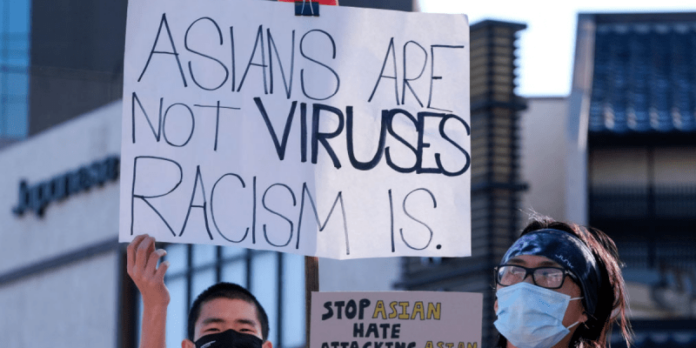On January 28, 2021, an 84-year-old Thai-American man, Vicha Ratanapakdee, was forcefully shoved on the ground in broad daylight in San Francisco, California. He was left with brain hemorrhaging and passed away shortly after arriving at the hospital.
This triggered the Stop Asian Hate movement. However, perhaps the most important question here lies is: Why does it take murder for people to recognize the persistence of racism?
Asian American Asian American Pacific Islander (AAPI) hate has been going on for decades, centuries, even generations. Whether you may or may not notice, it’s everywhere. I’ve experienced racism since elementary school by my own peers who were never educated on this topic. Eyes being “pulled back” and Asian accents mocked in broken English was normal to see and hear in the hallways– even the people being made fun of joined in too. Carving themselves into a new puzzle piece and concealing their culture just to be able to fit into the society built on racism.
Roots of oppression in America’s history can be traced back in significant events such as the Chinese Exclusion Act of 1882 and the Japanese American internment during WWII. Stereotypes like the yellow peril and the forever foreigner were legitimized by these times, harnessing the idea that Asians were taking away opportunities. How did the Americans combat this? By stripping away their rights, their freedom, and their families.
While violence does make news, micro-aggressions are ignored. AAPI or not, I’m sure you’ve heard the phrases, “No, where are you really from?” “You look so exotic.” “You speak English very well.” These manifestations of harmful stereotypes preserve the racist belief that Asian immigrants act as a threat to American beliefs and culture. It’s not just these comments either. Nonstop jokes harassing AAPI wind up being on the front page of the internet. Racist jokes not only perpetuate racism, but it also makes discrimination and prejudice seen as acceptable forms of humor. This encourages the spread of bigotry to not only teens but children too.
As I said prior, racism was an everyday thing in my elementary; the internet was even worse. People could say more destructive remarks because they can hid behind a screen in a dark room. It was a 50/50 on whether it was an old man with conservative beliefs or some teenager who thought it was peak comedy to be edgy.
Then the Coronavirus—or what former president Donald J. Trump called the “China virus,” struck during 2020, absolutely fueling anti-Asian hate. We didn’t just eat dogs, we started eating bats too. Being Southeast or East Asian immediately meant that you were infected. Government leaders and senior officials used the pandemic as an advantage to advance white-supremacist, anti-immigrant, xenophobic theories that demonize foreigners, refugees, and political leaders.
The real virus became hate.
Sinophobia and xenophobia are still relevant to this day. Earlier this year on January 31, 2024, TikTok and other social media companies such as Discord, Instagram, and Snapchat testified for tighter safety regulations online.
During the trial, Senator Tom Cotton used this to accuse TikTok CEO Shou Chew of being “affiliated with the CCP” (Chinese Communist Party). Chew was persistently questioned about his nationality and his citizenship, stating multiple times that he was born in Singapore, where he currently resides. Both countries deny dual citizenship, making Cotton’s allegations against Chew look racist. This sparked outrage from Singaporeans everywhere, mocking him for his inquiries and calling him “narrow-minded” and “ignorant.” Cotton defended his point by claiming Singapore is highly influenced by the CCP and has not elaborated since.
Cotton’s presuppositions about Chew’s nationality and stereotypes of Chinese being part of the CCP is evidence of the continuing incivility towards AAPI.
The Asian model minority myth has kept us from speaking up and speaking the truth. As a community, we are worth much more and could do much more than stay silent. When we say Stop Asian Hate, we don’t just mean the constant degradation and physical assault acted upon us. We mean the normalized jokes insulting our culture, the assumption that we can’t speak your language, and the degrading behavior showcased carelessly.
The internet is both an enemy and an ally. Raise awareness about this ongoing aggression. Use your voice. Most importantly, it doesn’t just stop at Asian communities. Oppression affects all races. We should be supporting each other, not poking holes in the boats of others. We are all facing the same storm. Our aim should be focusing on denormalizing the stereotypes assigned to us. We cannot keep tolerating this hate that takes lives day by day. We must fight, for ourselves and for the next generation to come.
So on behalf of all communities discriminated by society: we are not articles you read on the way to work. We are not on the news just for you to watch after coming back home. We are not headlines.

